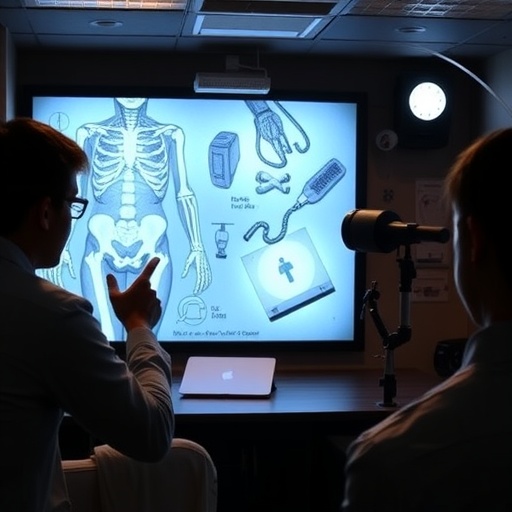In recent years, the integration of innovative teaching methodologies into medical education has become increasingly important. The complexity and dynamism of healthcare necessitate the development of educational approaches that not only convey knowledge but also engage learners actively. One such approach, highlighted in a groundbreaking study titled “Game-based learning in undergraduate medical education: evaluation of an interdisciplinary escape room,” offers a fresh perspective on how immersive and interactive environments can enhance the learning experiences of medical students.
The study, conducted by researchers Baessler, Hornung, Schuster, and colleagues, evaluates the efficacy of an escape room setup designed specifically for medical education. This research addresses a critical gap in traditional teaching methods, which often rely on passive learning techniques that fail to captivate the interests of contemporary students. In contrast, the escape room model presents a collaborative and competitive atmosphere where students must solve complex problems under time constraints, mimicking real-world medical challenges.
The escape room incorporated various educational principles, including teamwork, communication, and critical thinking. Participants were grouped into interdisciplinary teams, allowing them to pool their diverse knowledge and skills to navigate through medical scenarios. This multidisciplinary approach not only enhances subject matter understanding but also fosters an appreciation for the roles different healthcare professionals play in patient care. The design of the escape room was pivotal, as it aimed to simulate realistic medical environments and scenarios, thereby increasing the relevance of the academic content.
One of the most exciting findings of the study was the enhancement of student motivation and engagement. Medical students often experience burnout and fatigue due to the demanding nature of their studies. However, by integrating game-based learning, participants reported a revitalized interest in their coursework, as the escape room provided an engaging break from conventional lectures. This increase in motivation is crucial, as it can lead to improved academic outcomes and a greater likelihood of students pursuing further knowledge in their areas of interest.
Evaluation metrics for the escape room experience included pre- and post-participation surveys that assessed students’ knowledge retention, problem-solving abilities, and overall satisfaction with the educational experience. Results from these surveys indicated a significant improvement in both confidence and competency in the subject matter after participating in the escape room activities. This method of assessment highlighted the effectiveness of game-based learning in achieving educational goals.
Moreover, the interactivity and competitiveness of the escape room encouraged students to adopt a deeper approach to learning. Previous pedagogical models have often stressed rote memorization, but the immersive nature of the escape room required students to engage with the material critically and practically. This shift could fundamentally alter curricular designs in medical education, making room for more interactive formats that align with the needs of future healthcare providers.
The study also examined the potential for scalability and wider implementation of the escape room concept across various institutions. If adopted broadly, this educational model could foster a generation of medical practitioners who are not only knowledgeable but also adept in collaboration and problem-solving—skills that are invaluable in clinical settings. The implications of such an educational reform extend beyond individual institutions and could influence the overall culture of medical education.
As medical education adapts to an increasingly complex landscape, it is essential to embrace methodologies that foster practical skills alongside theoretical knowledge. The escape room model exemplifies how technology and innovation can converge to create impactful learning environments. The enthusiasm generated from this interactive approach is a clear indication of its potential to reshape future education practices.
Institutions are encouraged to consider integrating similar immersive learning experiences into their curricula. The collaborative efforts required in escape room scenarios can build camaraderie among students and encourage a supportive learning environment. Moreover, as students learn to work together under pressure, they develop not only their academic skills but also their emotional resilience—an essential trait for practitioners in high-stress medical fields.
While the positive outcomes of the study must be celebrated, the researchers also acknowledge potential challenges in implementing such innovative approaches. Cost, resource allocation, and faculty training are crucial factors that institutions will need to address. Nonetheless, the benefits of adopting game-based learning strategies in medical education could far outweigh these barriers, leading to confirmed advancements in student readiness for clinical practice.
As the healthcare landscape continues to evolve, it is imperative that medical education evolves likewise. Researchers’ commitment to exploring novel educational frameworks is a testament to their dedication to improving future patient care. The insights uncovered in this study underline the necessity of flexible, engaging, and effective teaching methods that prepare medical students for the realities of modern healthcare.
Lastly, the need for ongoing research into the efficacy of game-based learning in medicine cannot be overstated. As more institutions explore the potential of escape rooms and similar methodologies, it is vital to gather data on long-term impacts on student learning and patient outcomes. This study lays a foundation for future investigations into the role of interactive learning strategies across various disciplines in healthcare and beyond.
In summary, the pioneering study on game-based learning through the escape room concept illustrates a significant shift in medical education towards more engaging, collaborative, and effective teaching strategies. As this approach gains traction, it may herald a new era of educational practices that truly prepares students for the complexities of patient care in the 21st century.
Subject of Research: Game-based learning in undergraduate medical education.
Article Title: Game-based learning in undergraduate medical education: evaluation of an interdisciplinary escape room.
Article References:
Baessler, F., Hornung, T.P., Schuster, T. et al. Game-based learning in undergraduate medical education: evaluation of an interdisciplinary escape room.
BMC Med Educ 25, 1606 (2025). https://doi.org/10.1186/s12909-025-07990-2
Image Credits: AI Generated
DOI: https://doi.org/10.1186/s12909-025-07990-2
Keywords: Game-based learning, medical education, escape room, interdisciplinary approach, student engagement, problem-solving, curriculum reform.




